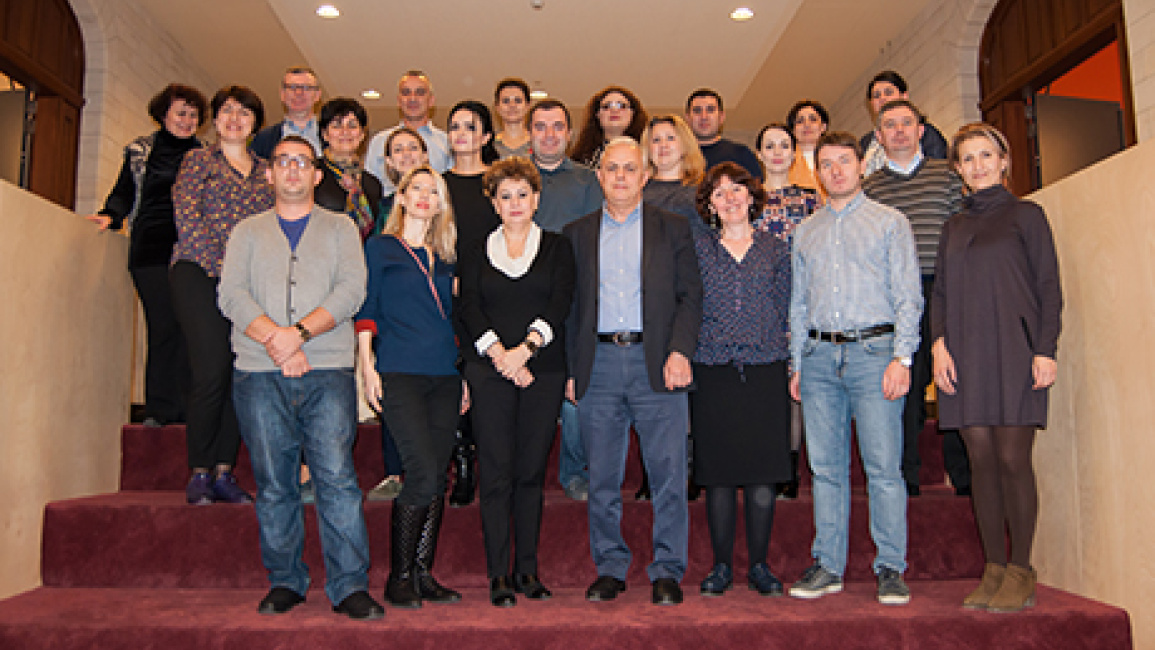- Main
- Node
- ACTIVE LEARNING METHODS IN HIGHER EDUCATIONAL INSTITUTIONS
November 26, 2018 | 17:41
Education
ACTIVE LEARNING METHODS IN HIGHER EDUCATIONAL INSTITUTIONS
The YSU PRINTeL team made up of the representatives of different YSU faculties visited the Catholic University of Leuven (KU Leuven), Belgium, within the framework of Erasmus+ CBHE PRINTeL project on November 9-18 to participate in the training course titled “Active Learning”.

The YSU PRINTeL team made up of the representatives of different YSU faculties – Gohar Madoyan (Romance and Germanic Philology Faculty, English Philology Department, PhD, Assistant Prof.), Karen Trchounian (Faculty of Biology, Chair of Biochemistry, Microbiology and Biotechnology, PhD, DSc, Assistant Prof.), Lilit Sargsyan (Romance and Germanic Philology Faculty, English Chair N2, PhD, Associate Prof.) and Tigran Sargsyan (Faculty of Geography and Geology, Chair of Service, PhD, Associate Prof.), visited the Catholic University of Leuven (KU Leuven), Belgium, within the framework of Erasmus+ CBHE PRINTeL project on November 9-18 to participate in the training course titled “Active Learning”.
The course was designed for lecturers of diverse specializations representing different HEIs of Armenia, Georgia and Belarus that are involved in the Erasmus+ CBHE PRINTeL project.
The Active Learning training course was conducted by W. van Petegem, Professor at the Faculty of Engineering Technology.
The trainees were assigned certain tasks, notably:
• To develop a certain course or program which would possibly include the methods and technologies advocated throughout the training course.
• To get acquainted with “Mentimeter” online teaching platform and apply it in corresponding tasks.
• To produce a course using Active Learning methods (Scavenger Hunt; Flipped Classroom, etc.)
Through joint efforts the YSU team prepared an inter-disciplinary course based on ADDIE model which was then discussed with the partners from Georgia and Belarus. In the course of the training reflections were made on the relevance of most diverse methods. The trainees also discussed the localization issues of the application of online, digital and information technologies and voiced mutual suggestions. Toward the end of the training course the participants agreed to discuss the future successful experiments concerning the main points and suggestions on the online platform.
Moreover, the YSU team was granted an opportunity to observe one of the courses of active learning delivered by Prof. van Petegem. The lecture was designed for MA first–year students who had different professions (over 100 students). The participants were granted a chance to watch the real teaching process and see the outcome of the application of active learning methods in the given class.
At the end of the course the participants were granted certificates.
The aim of the training course was to show that active learning methods make it possible for students to learn the material more effectively and get more involved into the educational process. Moreover, teaching based on this method implies not only a student-centered approach but harder and more intensive work on the part of the teachers, as well.
Hence, it is highly recommended that that these methods be introduced into different departments of the university and an observation be carried out among students. This would certainly lead to more tangible results in the process of the improvement of the overall quality of education.

